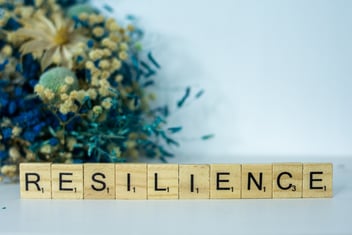Shaking Off Life's Challenges and Rising Stronger: Mastering Emotional Resilience
No video selected
Select a video type in the sidebar.
One day a farmer’s donkey fell into a well. The animal cried for hours as the farmer tried to figure out what to do. Finally, he decided the animal was old, and the well needed to be covered up anyway–it just wasn’t worth it to retrieve the donkey.
He invited all of his neighbors to come over and help him. They all grabbed a shovel and began to shovel dirt into the well. At first, the donkey realized what was happening and cried horribly. Then, to everyone’s amazement, he quieted down.
A few shovel loads later, the farmer was astonished at what he saw. With each shovel of dirt that hit his back, the donkey would shake it off and take a step up. As the farmer’s neighbors continued to shovel dirt on top of the animal, he would shake it off and take a step up. Pretty soon, everyone was amazed as the donkey stepped up over the edge of the well and happily trotted off!
Now you’re thinking, Okay, Joey, why are we talking about donkeys and farmers? Well, we’re not. I just like the story. It’s one of those old fables that have been around forever and it’s a simple illustration of what I want to talk about today. Here’s the moral at the end of the story:
Life is going to shovel dirt on you, all kinds of dirt. The trick to getting out of the well is to shake it off and take a step up. Each of our challenges is a stepping stone. We can get out of the deepest wells just by not stopping, never giving up. Shake it off, and take a step up.
The story is about resilience. There are many types of resilience but what I want to focus on today is emotional resilience. If you look at people who live the life that they aspire to, what you will see is that they have a high capacity for resilience. If you look at individuals who have created outstanding outcomes, a professional athlete, a world class entrepreneur, an executive at a Fortune 100 company, an extraordinary humanitarian who has changed the world, you're going to see human beings who embody a tremendous amount of resilience. And they trained it. It didn't just happen.
Nobody's born resilient. It's something that we have to train and cultivate. Sometimes we do that intentionally and consciously, and a lot of times it just happens, by way of the people we happen to be trained by, like, coaches or mentors or just the environments or situations we find ourselves in (like the donkey in the well). And in today's reality, fewer and fewer people are subject to environments and training that translates to high levels of resilience. The byproduct of this is people are struggling more than ever in terms of being fundamentally happy.
A person with a low capacity for emotional resilience is unhappy a lot of the time. They live with sadness. They live with depression. They live with insecurity, shame, and fear. But individuals who have a high capacity for emotional resilience don't experience nearly as much pain and dissatisfaction and suffering as those who lack resilience. It doesn’t mean they don’t have those feelings; it just means they don’t get stuck there. They shake those emotions off their backs and use them to climb out of the well.
So one aspect of resilience is the ability to tolerate discomfort and be in action anyway. Maybe I’m having a big challenge at home or with my family, maybe my kids are struggling, maybe I'm going through a divorce or a separation. And there's a high level of pain and discomfort associated with that challenge. People who have a high capacity for emotional resilience are able to go, Wow, this isn't easy. There's a lot of emotional discomfort here. Yet I'm still able to show up in the other areas where I need to show up.
Whereas if I have a low capacity for emotional resilience, and a struggle or a challenge shows up in my life, now all of a sudden other people can't rely on me. My work starts to deteriorate. My performance goes down, maybe I get fired. I start expecting the world to accommodate me. I ask for time off. I ask for exceptions. I think other people should understand that because I'm in pain, they should help me out. And I'm not saying that we can't have help when we're going through tough times, or that we can't ask for help. You absolutely should. In fact, a person with high resiliency knows when it’s time to ask for help rather than continuing to suffer. The point is, ask yourself, Am I capable of managing discomfort and being in action?
Another question to ask: How am I able to manage my execution? Let's say you’re in a relationship with someone you care about, a child or a significant other, maybe a friend or coworker, and you notice, Wow, I'm angry, or I feel sad. I feel hurt in some manner. What is my ability to not act out the painful emotion? If I have a low capacity for resilience, I get angry and I lash out, right? I just feel angry, and I name call. And I yell and I scream, and I put other people down. If I have a high capacity for resilience, I will notice that I'm angry and I’ll go, Okay, I need to be aware of my actions here and potentially not act on this emotion because I might do more harm than good.
So, again, it's not that we don't feel uncomfortable or painful emotions. We will, even when we have high resiliency. The difference is, I can feel a certain way, but I don't have to act out that emotion. I can feel it and then be discerning around the actions that I take. I can make sure my action still aligns with the vision or the outcome that I want to create and the person I want to be, even if I'm not feeling up to it in that moment.
Another example of resilience is being able to change emotion. The higher ability of resilience that I carry, the better I am at evolving the emotions that I feel. So if I feel angry, my capacity to shut that anger down and access compassion is acute. If I feel insecure, I can dissolve that insecurity, I can calm that insecurity, and I can access a sense of confidence or inspiration or acceptance or joy. With a high capacity of resilience, I'm actually able to make those changes.
Emotional resilience is the ability to not be affected by our environment. Somebody with a high level capacity for emotional resilience can be in difficult environments or situations and not react to and be defined by those environments and situations. But this ability doesn’t always come naturally. Building a high capacity for resilience requires training emotional awareness. We've got to develop sensitivity to how we feel. What are our emotions? Am I happy? Am I sad? Am I angry? Do I feel shame and guilt? Do I feel peace and serenity? Where am I? If I'm not aware of how I'm feeling and what emotions are there, those feelings and emotions are just driving my actions and I don't have any kind of influence over them.
Then we've got to train what I think of as nervous system management. How do I calm the sympathetic nervous system down? When that fight or flight kicks in, how do I get my parasympathetic nervous system more active so that I access those love based states? I have to train the ability to influence my own nervous system by way of breath, by way of focus technique, by way of internal training methods.
And that sets us up for emotional training and conditioning. How do we access the emotions that we want to feel, the experiences we want to have, and take that into the different elements of our life. How do we access joy and train it so that it's a primary way of being as who I am and in my nervous system? So that joy becomes the norm and inspiration becomes the norm. For so many people, anxiety is the reflex that's normal and natural. Anger, insecurity, and fear is the norm and the natural. That's their reflex. That's what has become easy to do in their nervous system. With the right training, joy can become the reflex.
Let’s wrap up with another parable, called The Two Wolves:
An old Cherokee was teaching his grandchildren about life. He said, “A battle is raging inside me…it is a terrible fight between two wolves. One wolf represents fear, anger, self-pity, guilt, and resentment. The other stands for joy, peace, love, serenity, and compassion.”
The old man looked at the children with a firm stare. “This same fight is going on inside you, and inside every other person, too.”
They thought about it for a minute, and then one child asked his grandfather, “Which wolf will win?”
The old Cherokee replied: “The one you feed.”
If you’re ready to develop emotional resilience as your normal way of being, join us for a Power Series program. We go deep into how the nervous system functions and how we can learn to influence it so that we’re able to feed the wolf we choose. Click HERE to learn more and sign up today!



